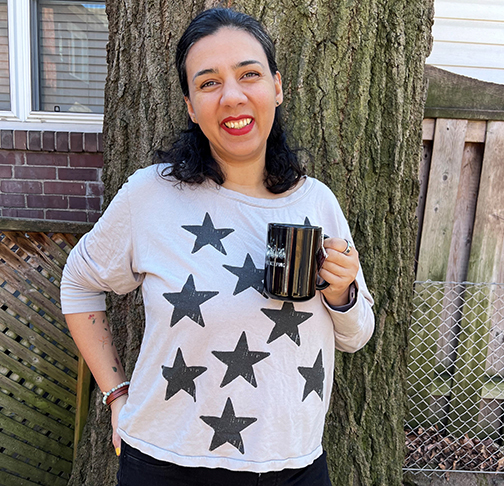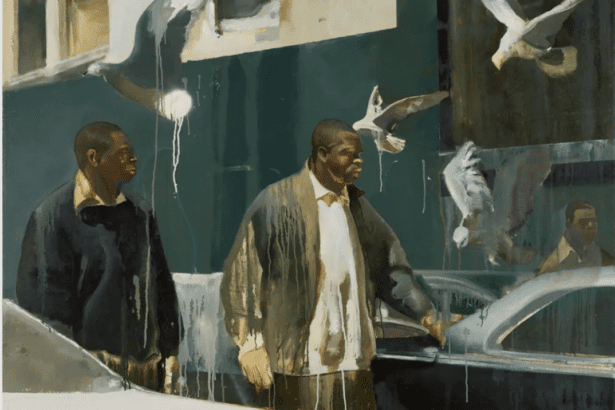Dr. Sheila Colla is an entomologist, professor, researcher, mother, and champion of social justice. Photo by Mimi Liliefeldt.
By MIMI LILIEFELDT
Throughout history, great minds have stated our need for justice, there are endless quotes on the subject. Though questions have been asked, and fingers have been pointed, no one seems to be able to resolve the imbalance of justice once and for all.
I met with Dr. Sheila Colla, an entomologist, professor, researcher, mother, and champion of social justice over Zoom a few weeks ago. Our discussion made me reflect on why some people are driven towards activism, though most are not, and some use their voices to boast their own narrative, only to end up drowning out the ones that need to be heard (i.e. performative).
Sheila’s mother came to Canada as an eight-year-old girl from Trinidad and her father arrived from Italy when he was 28 years old to study English. Sheila grew up in Scarborough and North York with her three siblings.
Her parents were teachers who worked extra jobs to make life comfortable for their family, while Sheila the ever-studious child focused on science and music. Her interest in sciences lead to her PhD in Biology, which eventually brought her to her career as a Conservation Scientist whose Pollinator Research Lab can be found at York University where she is a professor.
When I asked Sheila how she arrived at bee conservation she said, “as a kid growing up in Toronto with immigrant parents, I didn’t really have much of a camping or cottaging upbringing. I thought those annoying wasps trying to get my hamburger at the end of the summer were bees until my early 20s. It was only through the research placements and undergrad trips that I learned more about biodiversity and decided to make it my career.
“I have no idea what kinds of backgrounds people have and whether they’ve been taught about the diversity and importance of insects to our ecosystems and food systems. I think it helps people to know that even someone like me can learn something like the difference between a bee and a wasp kind of later in life and go on to write books about them!”
As a woman working in the field of entomology, Sheila is certainly a minority which comes with its own set of injustices. “I’m often the only woman of colour in the room. Especially with entomology, insects tend to be a mostly male dominated field of study. . .
“Lots of times, even though I’ve published things or been the only person to have published on certain things, a man would be chosen to do an interview or be taken more seriously than me. I run into that kind of thing a lot. Just not being taken seriously despite the standard metrics of academia, publishing in high-ranking journals, giving conference talks and that kind of thing.”
But Sheila is no wallflower. Once she reached tenure, she became more confident in speaking out about the lack of equality in her field.
She actively uses her voice on Twitter (X) where she has close to 10,000 followers and she said, “For the Society of Conservation Biology (SCBNA), I’m on the Equity Committee, Board of Directors, that’s for my field in general so I can make change in that way.”
But the changes needed in her field and in our everyday interactions seem endless and often times disheartening. “At York we had a white man who was invited to talk about equity in science. EDI in science in Canada… I asked the person who invited that person why they invited them instead of you know, this Black woman who’s doing very similar work? Or I could give a million examples of other people who I would’ve picked. Other people who should’ve been invited instead, especially for paid presentations.”
When I asked what the response was, she said, “That person said she believed that men would only listen to other men. Which I don’t necessarily buy as a good reason for inviting men to talk about equity.”
Life outside of her science world is no less riddled with societal challenges.
She has co-run one of the largest east end parenting groups on Facebook. “I’ve seen the power in other groups with like one or two admin who almost in all cases are white. They think that the groups are just about the east end but things like Palestine come up, anti-Black racism comes up, and they don’t know what to do so their solution is to delete and block the people who are talking about it. So, they are making these spaces where they cannot be critiqued in their actions. I see that a lot on Facebook groups. . .
“There was another local group, where I forget what happened, some sort of hate crime against Muslims and the admin was trying to set up something about white people and brown people walking to the subway together for safety. And I was like, this a ‘white saviour’ type of solution and doesn’t get to the problem and then he blocked me and deleted me from the group for that comment. I was just pointing out that it’s not a good idea…”
The idea that there is no room for questioning or discussing potential solutions exposes the much talked about but often denied white fragility. No one wants to hear it, but it’s not good enough that your “heart was in the right place” if your actions still negatively impact others.
We talk about listening and raising the voices of marginalized people, but when push comes to shove and egos are tested the threat of exposure becomes too high and the voices of BIPOC are muted, blocked, and deleted.
Sheila, however, is determined and resilient. She will not accept the status quo. In her lab and in her life outside of it, Sheila speaks out to defend, support and elevate the growth of others, especially those who are unaccustomed to having advocates.
Which is why her staff and students, almost exclusively women and women of colour want to work with her. She does this because it matters to her to support people, even at the risk of her research work being as she said, “not (always) as productive as other professors.”
“I make my beliefs and politics so open and obvious that I attract those kinds of students (students who might need more support for various reasons); I generally don’t say no. It’s just kind of how it generally works out and I’m OK with that. I don’t train a lot of men. I’m an entomologist, I work with insects, so that means I’m changing the face of what it means to be an entomologist, so it won’t be the same as what I experienced when I was going through it.”
Sheila has long been a champion of others. But now she is in the unfair position of needing help herself.
Approximately six months ago Sheila was diagnosed with mesothelioma, a type of cancer that is caused by exposure to asbestos.
The news is obviously devastating and yet, it has been the opportunity for all those she has built communities with to return the favour. It is these communities that are rallying around her and taking their turn to support her.
When I asked Sheila how she copes with the unfairness of having to go through this illness she answered me honestly: “This is something I’m also working through. Right now, I need to focus on healing and not think too much about this.”
Her amazing friends have set up a Go Fund Me page for Sheila as her treatment may require medical attention that might be out of the scope of our healthcare system or perhaps even be best treated outside the country where costs would not be covered.
If you would like to read more about her and donate, this is the link:
This kind of community mindedness and protection is ultimately the kind of world we say we want to live in. One in which we each selflessly work towards true equity and support of others, and in turn we can have the comfort in knowing if our safety or wellness is ever in jeopardy that we can rely on others, and that our social and government systems will be there for us.
But this takes work and action. We cannot only care about the matters that directly affect us.
People like Sheila use their gifts and advantages to help keep us accountable to each other. The reality is we can’t stop bad things from happening, sometimes good people must face injustice, but hopefully if they must face it, it’s not alone.
As Martin Luther King Jr famously said: “Injustice anywhere is a threat to justice everywhere. We are caught in an inescapable network of mutuality, tied in a single garment of destiny. Whatever affects one directly, affects all indirectly.”
— Mimi Liliefeldt is a Beach resident and business owner. She can be reached at [email protected]
Was this article informative? Become a Beach Metro Community News Supporter today! For 50 years, we have worked hard to be the eyes and ears in your community, inform you of upcoming events, and let you know what and who is making a difference. We cover the big stories as well as the little things that often matter the most. CLICK HERE to support your Beach Metro Community News!




